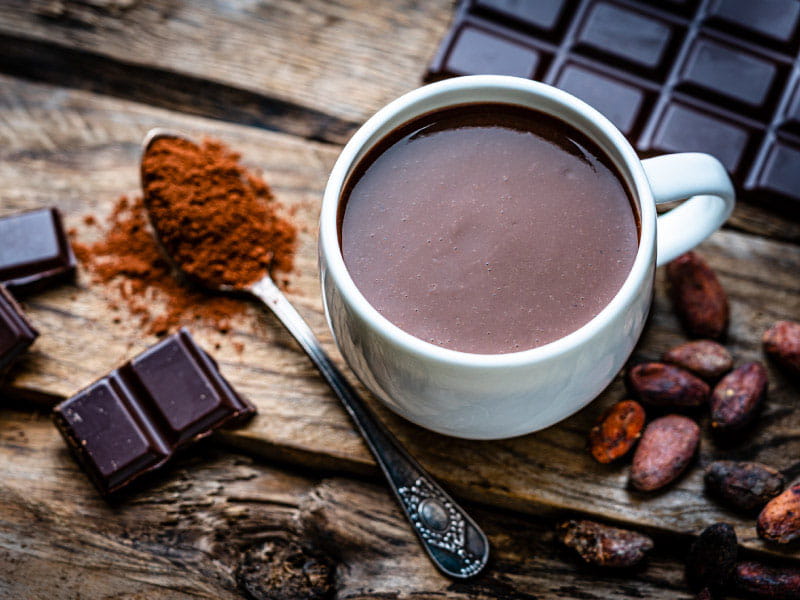Sweet on chocolate? It's what's inside – cocoa powder – that counts
By Michael Precker, American Heart Association News

It's a headline sure to make people keep reading: Is chocolate good for you?
Almost everyone wants the answer to be yes, of course. But there isn't a simple response to be swallowed whole. So, like a good bar of chocolate, let's break it into bite-sized pieces.
Chocolate actually starts with the cacao bean, the seed of the fruit of a cacao tree. It contains fiber and natural compounds with antioxidant properties called phytonutrients. Fiber is great for the digestive tract and may lower the risk of heart disease and some cancers, while antioxidants are believed to help the body resist heart disease, cancer and other diseases.
Crushed and roasted, the cacao bean becomes cocoa, the basic building block of chocolate.
The idea of cocoa as a key to health isn't new. The Mayans and Aztecs believed cacao was a gift from the gods, and used it for healing and for rituals. The cacao tree is native to the Americas, but once Europeans heard about it, they caught on fast. The Florentine Codex, written in the 16th century by a Spanish friar describing life in the New World, was just the first of many reports enlightening Europe about cacao's medicinal benefits.
More recently, studies have suggested that cocoa consumption might help with heart health factors such as blood pressure and cholesterol, and can boost artery health, vision and brain function.
So, are you putting down the celery and reaching for a chocolate bar? Not so fast.
"Hopefully, I'm not going to give an answer that's too depressing," said Dr. Deepak L. Bhatt, director of Mount Sinai Fuster Heart Hospital in New York City. "I am a chocolate lover, but I'm not deceiving myself that I'm doing it for anything except giving myself a treat."
The reason is all too clear: To turn bitter cocoa powder into delicious, irresistible chocolate, we add sugar and fat.
"That means extra calories and saturated fat," said Haley Kanada, a registered dietitian nutritionist with UC Davis Health in Sacramento, California. "So, it's important to stick to a serving size to prevent weight gain and balance it out with a healthy diet."
Of all the research suggesting possible links between cocoa and heart health, Bhatt said he is most influenced by the Cocoa Supplement and Multivitamin Outcomes Study, or COSMOS, a large 2022 study published in the American Journal of Clinical Nutrition. In a randomized clinical trial, more than 20,000 older adults were given either a capsule containing cocoa extract or a placebo daily, then tracked for a median of 3.6 years.
The researchers reported that the cocoa extract did not significantly reduce cardiovascular events but did reduce cardiovascular death by 27%. They said a longer follow-up was needed to examine the difference.
"The gold standard in science is doing randomized placebo trials," Bhatt said. That was done in the COSMOS trial, which didn't show any significant benefit, he said. If you dig down, some signals exist, Bhatt said, but "I don't think those signals are enough to say go have cocoa for the purpose of cardiovascular health."
But until sweeter research comes along, don't expect our love affair with chocolate to cool. Nutrition experts have long advised there's nothing terribly wrong with up to 2 ounces of dark chocolate daily. Kanada suggests no more than 1 ounce a day. Dark chocolate is preferable to milk chocolate because it has more cocoa solids and less sugar – although the same number of calories. White chocolate, by the way, has no cocoa solids.
"Typically, the darker the better," she said. "At least 70% so you're sure you're getting the benefits."
Raw cacao or cocoa powders are too bitter to consume by themselves, but they can be added to other foods for "some chocolatey flavor without adding actual chocolate," Kanada said.
Try sprinkling some raw cocoa powder onto oatmeal or fruit or adding it to your morning smoothie. "You're getting the chocolatey flavor and the sweetness from the fruit, but you're not getting any added sugar," she said.
Want to sip on a healthier hot cocoa? Kanada prescribes unsweetened almond milk, cocoa powder and a dash of maple syrup.
It might take a little getting used to, she acknowledged, "but there are ways to get creative where you don't have to rely on the packaged hot cocoa mix," which has lots of sugar.
All this is not to say that chocolate doesn't promote other kinds of health.
"To the extent it makes people feel better," Bhatt said, "it's probably a good thing for mental health but not really for cardiovascular health."





